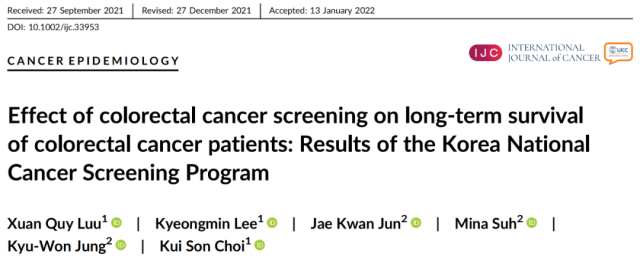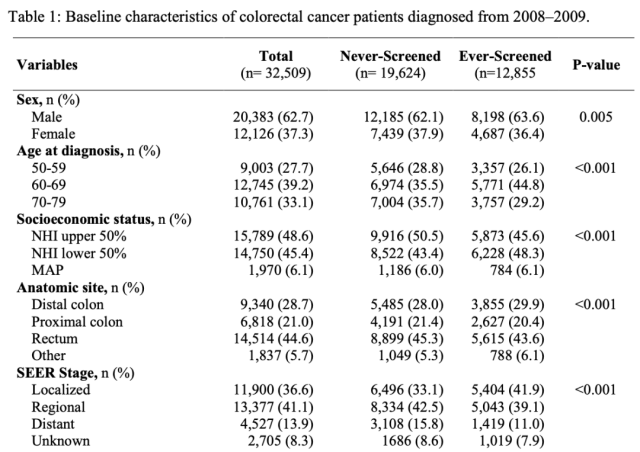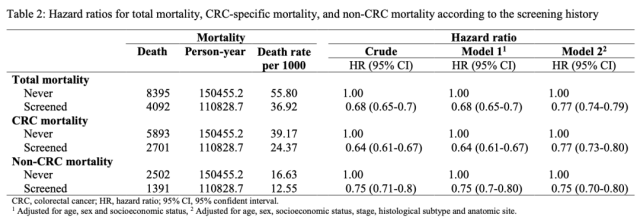Is there other screening for colon cancer if you are afraid of colonoscopy?
- Normal Liver Cells Found to Promote Cancer Metastasis to the Liver
- Nearly 80% Complete Remission: Breakthrough in ADC Anti-Tumor Treatment
- Vaccination Against Common Diseases May Prevent Dementia!
- New Alzheimer’s Disease (AD) Diagnosis and Staging Criteria
- Breakthrough in Alzheimer’s Disease: New Nasal Spray Halts Cognitive Decline by Targeting Toxic Protein
- Can the Tap Water at the Paris Olympics be Drunk Directly?
Is there other screening for colon cancer if you are afraid of colonoscopy?
- Should China be held legally responsible for the US’s $18 trillion COVID losses?
- CT Radiation Exposure Linked to Blood Cancer in Children and Adolescents
- FDA has mandated a top-level black box warning for all marketed CAR-T therapies
- Can people with high blood pressure eat peanuts?
- What is the difference between dopamine and dobutamine?
- How long can the patient live after heart stent surgery?
Is there other screening for colon cancer if you are afraid of colonoscopy?
Among cancers, the incidence rate is the second, and the mortality rate is the fourth. On average, one person is diagnosed every minute… This is the current situation of colorectal cancer in some countries [1].
To change this situation, the best way is to conduct colorectal cancer screening comprehensively and early, so as to truly achieve early detection, early diagnosis and treatment.
Compared with those cancers with insignificant early symptoms and lack of effective screening methods, the screening methods and benefits of colorectal cancer are very clear.
The 5-year survival rate of patients diagnosed early can reach 80-90%. Less than 15% of patients in the sexual stage can be said to be worlds apart [2].
If you find traditional colonoscopy screening unacceptable, there are other methods available.
Recently, the International Journal of Cancer ( International Journal of Cancer ) published a new study from South Korea, which found that the long-term survival rate of colorectal cancer patients with a history of screening was significantly higher than that without a history of screening.
The highest risk of death can be reduced by more than 50% in patients with early-stage bowel cancer (HR=0.48) [3].

Thesis title map
The study was jointly completed by scientists from the Korea National Cancer Center and the Cancer Prevention and Control Institute.
The enrolled colorectal cancer patient information was obtained from the Korea Central Cancer Registry (KCCR), and the death information was obtained from the National Bureau of Statistics.
Colorectal cancer screening Historical information was obtained from the National Cancer Screening Program (KNCSP).
KCCR collects more than 95% of cancer incidence information in Korea, which greatly reduces the randomness of sampling.
KNCSP has launched early colorectal cancer screening for people aged 50 years and older as early as 2004.
The screening method is a fecal immunochemical test (FIT) based on stool, which has been applied to several large-scale screening methods. Check the plan [4].
However, few studies have reported whether FIT-based screening in large populations is associated with patient survival, and only a few studies have reported the relationship between FIT screening and the stage of colorectal cancer patients [5, 6].
Enrolled patients were diagnosed with colorectal cancer between January 1, 2008, and December 31, 2009, and were 50 to 79 years of age (the FIT screening program targets people aged 50 to 79 years).
After excluding 2,100 patients with a history of other cancers and 560 patients with incomplete information, a total of 32,059 colorectal cancer patients were enrolled.
The FIT screening history of these patients was obtained through the KNCSP and the time frame was from 2004 to 2009.

Baseline Characteristics of Study Enrolled Patients
The researchers followed the enrolled patients for 10.5 years and found that compared with patients who had never undergone colorectal cancer screening, patients with a history of FIT screening had a 32% lower risk of death (HR=0.68; 95% CI: 0.65- 0.70) .
Cancer stage is also clearly associated with risk of death, but after the introduction of early and late cancer information into the statistical model, the risk of death in patients with a history of screening was still 23% lower than that in patients without a history of screening.
Death of a patient is easy to judge, but the cause of death may be either colorectal cancer or other factors.
The researchers divided the patients into two groups according to the cause of death, namely colorectal cancer-related death and non-related death, and found that the impact of FIT screening history on mortality was similar in the two groups, with a 23% relative reduction in the risk of colorectal cancer-related death, and non-related deaths.
There was a 25% relative reduction in the risk of colorectal cancer-related death.

Long-term survival benefit from FIT screening
Does gender influence the long-term survival benefit of colorectal cancer screening? The analysis showed that men and women had similar survival benefits from screening.
Lifestyle also has a significant impact on the survival rate of colorectal cancer.
Although the study did not obtain information on the living habits of patients without screening history, it cannot be directly evaluated, but there is no difference between males and females, which indirectly indicates that lifestyle may affect the survival rate of patients with colorectal cancer.
The long-term benefits of screening are of little consequence.
Cancer stage is also a key factor affecting long-term survival. The researchers grouped patients by cancer stage and found that FIT screening had the greatest survival benefit in early-stage patients, with a greater than 50% reduction in the risk of death (HR=0.48; 95% CI, 0.42-0.56); in advanced-stage patients, FIT screening also reduced the risk of death by 9%.
In this fast-paced society, what everyone lacks the most is time. It would be great if screening could be done once and for all. However, the study also found that the long-term survival benefit of FIT screening declined over time : Among all patients who underwent FIT screening, FIT screening had the greatest survival benefit if they became ill within 1 year after screening, and Decrease over time; long-term survival benefit from FIT screening is not apparent if the disease is 2 years or more after screening.
The 10-year survival rate of colorectal cancer patients in this Korean study is as high as 62%, which is also significantly higher than the recent study data in the United States (54.3%) [7], which may be related to the high rate of early diagnosis of colorectal cancer in South Korea, after all From 2002 to 2013, the number of colonoscopy examinations in Korea increased from 260,000 to 2 million.
However, the study did not include the treatment information of patients, and could not evaluate the relationship between long-term survival and cancer treatment. In addition, the SEER system was used for cancer staging [8], which is inconsistent with the current popular TNM staging system [9].
Despite these shortcomings, this study is the first to evaluate the long-term survival benefit of colorectal cancer screening by FIT in an Asian population. The information was collected from national centers with high reliability.
Compared with European and American populations, South Korea is more similar to some countries in terms of economic foundation, cultural structure, living habits and genetic background, and has greater reference value.
With the aging of the population in some countries, the number of people at high risk of colorectal cancer will increase, and it is more necessary to detect and treat cancer early.
However, only 14% of people at high risk of colon cancer in China have compliance with colonoscopy [10], so it is necessary to use simpler and more reliable technologies to promote early screening and diagnosis of colorectal cancer.
Many domestic units have been developing new early screening methods, including the detection of host DNA in feces [11-13] and the detection of intestinal flora DNA [14-16]. These methods sample similarly to FIT, but perform more reliably than FIT.
Excitingly, large-scale colorectal cancer screenings of hundreds of thousands of people have been carried out in cities [17], which has greatly promoted the prevention and control of colorectal cancer.
It is hoped that the advancement of technology will allow early screening to spread to more colorectal cancers. high-risk groups.
references:
1.Wang, W., et al., Mortality and years of life lost of colorectal cancer in China, 2005-2020: findings from the national mortality surveillance system. Chinese medical journal, 2021. 134(16): p. 1933-1940.
2.Crooke, H., et al. Estimating 1- and 5-year relative survival trends in colorectal cancer (CRC) in the United States: 2004 to 2014. Journal of Clinical Oncology, 2018, 36(4_suppl): p. 587.
3.Luu, X.Q., et al., Effect of colorectal cancer screening on long-term survival of colorectal cancer patients: Results of the Korea National Cancer Screening Program. Int J Cancer, 2022.
4.Bénard, F., et al., Systematic review of colorectal cancer screening guidelines for average-risk adults: Summarizing the current global recommendations. World J Gastroenterol, 2018. 24(1): p. 124-138.
5.Vicentini, M., et al., Impact of screening programme using the faecal immunochemical test on stage of colorectal cancer: Results from the IMPATTO study. Int J Cancer, 2019. 145(1): p. 110-121.
6.Larsen, M.B., et al., Effectiveness of Colorectal Cancer Screening in Detecting Earlier-Stage Disease-A Nationwide Cohort Study in Denmark. Gastroenterology, 2018. 155(1): p. 99-106.
7.Cheng, E., et al., Analysis of Survival Among Adults With Early-Onset Colorectal Cancer in the National Cancer Database. JAMA Netw Open, 2021. 4(6): p. e2112539.
8.Wu, X.C., et al., Comparisons of directly coded SEER Summary Stage 2000 and Collaborative Staging Derived SEER Summary Stage 2000. J Registry Manag, 2010. 37(4): p. 137-40.
9.Amin, M.B., et al., The Eighth Edition AJCC Cancer Staging Manual: Continuing to build a bridge from a population-based to a more “personalized” approach to cancer staging. CA Cancer J Clin, 2017. 67(2): p. 93-99.
10.Chen, H., et al., Participation and yield of a population-based colorectal cancer screening programme in China. Gut, 2019. 68(8): p. 1450.
11.Laird, P.W., The power and the promise of DNA methylation markers. Nature Reviews Cancer, 2003. 3(4): p. 253-266.
12.Muzny, D.M., et al., Comprehensive molecular characterization of human colon and rectal cancer. Nature, 2012. 487(7407): p. 330-337.
13.Imperiale, T.F., et al., Multitarget Stool DNA Testing for Colorectal-Cancer Screening. New England Journal of Medicine, 2014. 370(14): p. 1287-1297.
14.Zeller, G., et al., Potential of fecal microbiota for early-stage detection of colorectal cancer. Molecular Systems Biology, 2014. 10(11): p. 766.
15.Thomas, A.M., et al., Metagenomic analysis of colorectal cancer datasets identifies cross-cohort microbial diagnostic signatures and a link with choline degradation. Nature Medicine, 2019. 25(4): p. 667-678.
16.Wu, Y., et al., Identification of microbial markers across populations in early detection of colorectal cancer. Nature Communications, 2021. 12(1): p. 3063.
17. Wuhan launches free colorectal cancer screening for key populations, http://www.cnr.cn/hubei/yw/20211022/t20211022_525639690.shtml
Is there other screening for colon cancer if you are afraid of colonoscopy?
(source:internet, reference only)
Disclaimer of medicaltrend.org
Important Note: The information provided is for informational purposes only and should not be considered as medical advice.



